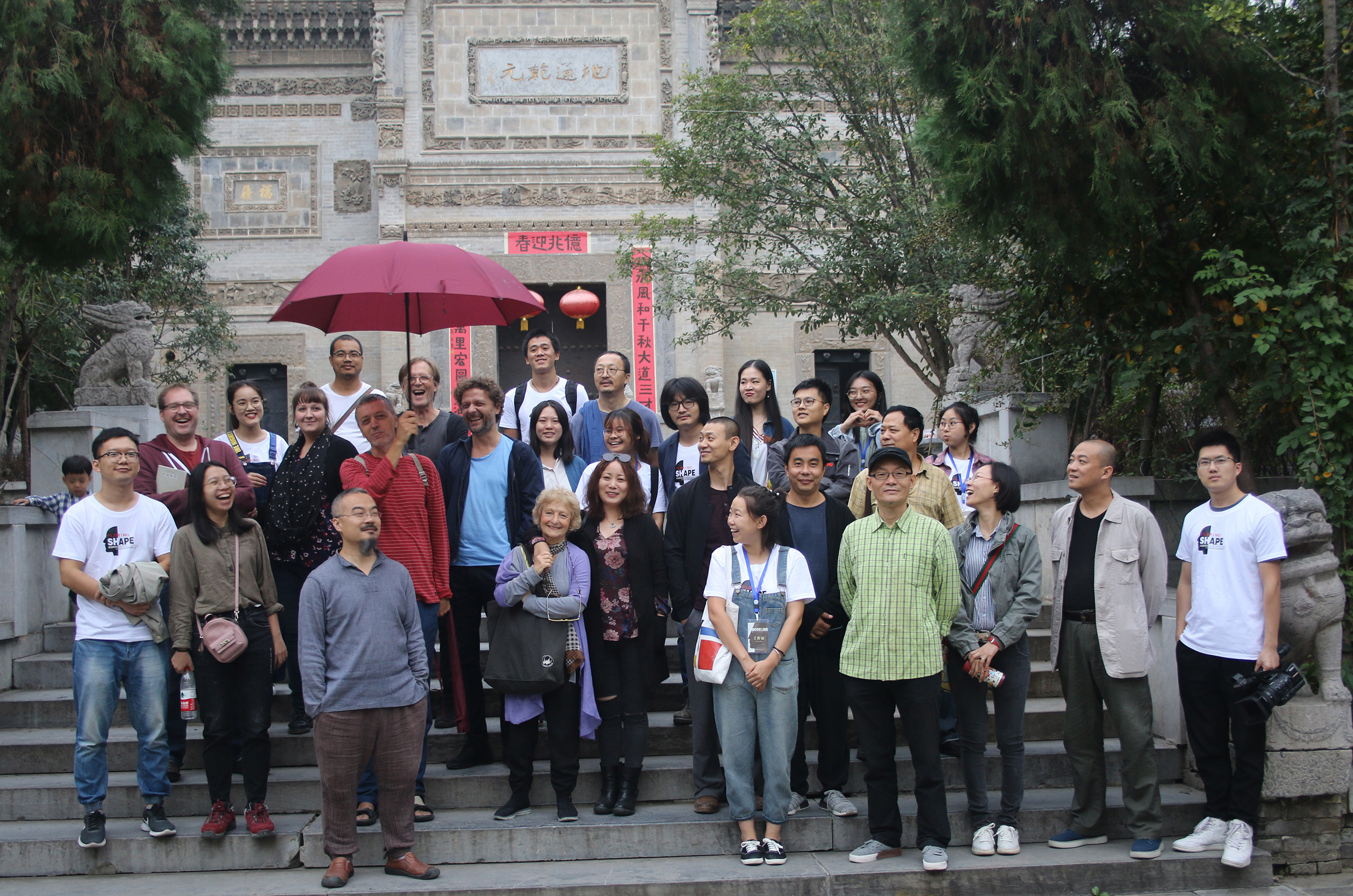
Roundup: CCAD faculty do awesome work abroad
At Columbus College of Art & Design, faculty are encouraged to pursue knowledge outside the walls of the campus—and the country. When their vision, practice, and pedagogy are shaped by exposure to different cultures, influential scholars, and emerging research, our students benefit exponentially. Here are some highlights of recent faculty abroad experiences and research.

Tim Rietenbach sculpts in China
Professor of Fine Arts Tim Rietenbach was one of only 20 professors in the world invited to participate in the Xi'an Academy of Fine Arts’ first Xi'an International Sculpture Workshop (XISW) in September. On the first day in China, the group took a visit to the site of the famous, 8,000-strong Terracotta Army.
“The biggest takeaway being,” Rietenbach said, “why would anyone ever need to make another sculpture out of clay?”
But that’s exactly what Rietenbach and his peers were tasked with once they arrived in the workshop studio: Sculpt a piece of clay art to be cast in bronze. They would work from a large, newly formatted studio space a stage that would accommodate two nude models for seven hours a day for seven days.
“I was on the opposite side of the Earth, exhausted by jet lag with zero language skills and the most foreign element of the trip turned out to be the studio activity that we were all gathered to do,” Rietenbach said. “Although our XAFA hosts went out of their way to assure us that it was not a competition, but rather an opportunity for cultural exchange, everything in the opening ceremony suggested otherwise.”
For example: The “impending shark attack” soundtrack; a camera crew on hand throughout the process; matching aprons, tools, and equipment.
“The resulting vibe was part reality show, part game show,” he said. “But mostly it just felt like being a student in a classroom.”
After the standing stage models left him feeling uninspired on day one, he decided to sculpt the bored-looking model, he said, “as accurately as I could in the most common academic standing pose but render it upside down—a stalling tactic that also became a strategic move to mislead my competition. Just kidding, I was clueless. Oddly, I did enjoy doing something that academic and difficult. I tried to convince the Chinese that upside down nudes were the latest trend in the West.”
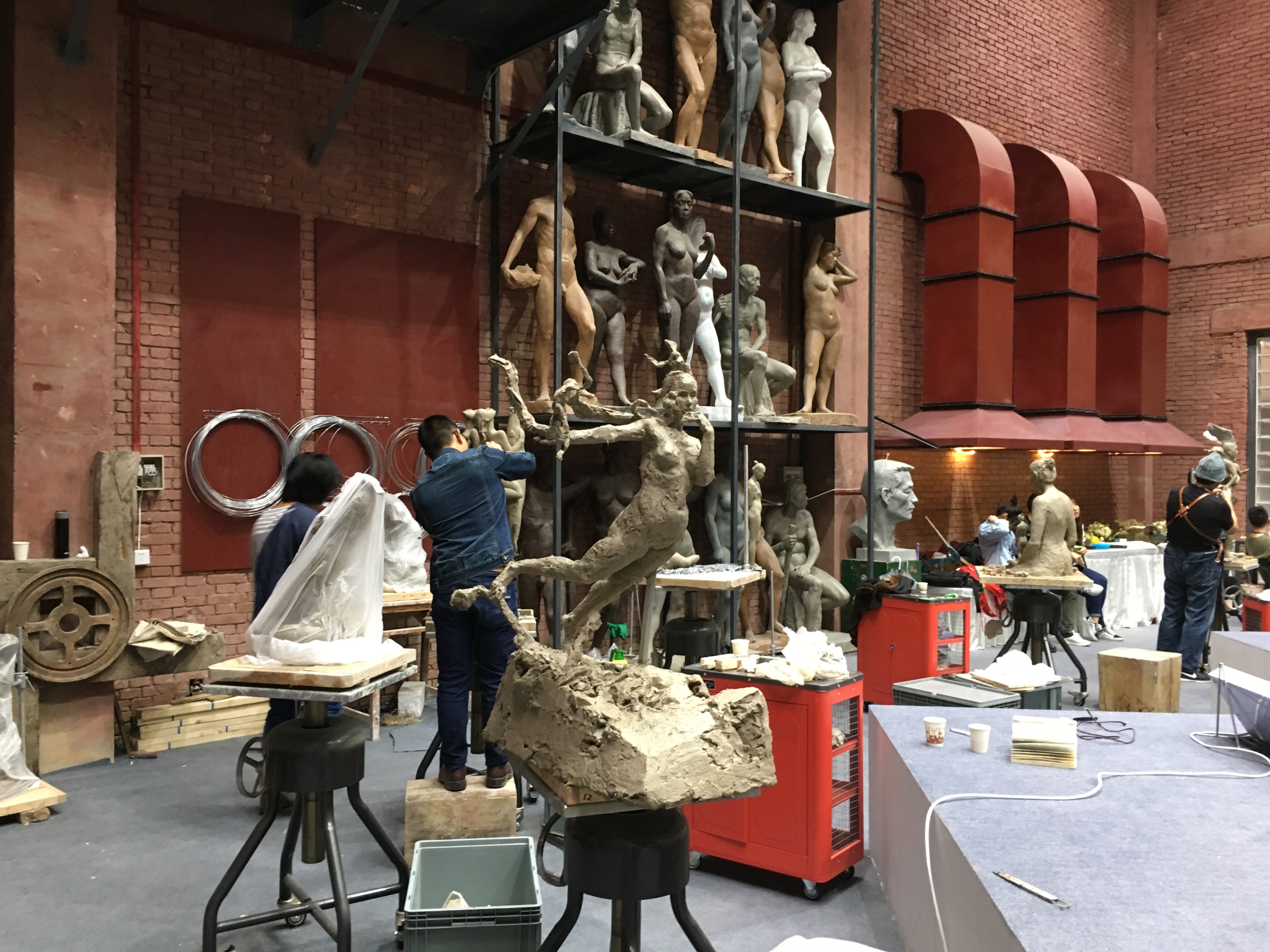

It wasn’t until one of his hosts, on a group trip to a village museum, explained that the four-inch doll-like shoes on display at the museum were a relic of Chinese foot binding in which one method was to break a woman’s toe bones and fold them under her feet to keep them small.
“Although, it is common knowledge that the binding of feet occurred,” Rietenbach said, “the broken toe method was new to me and beyond comprehension.”
The new knowledge inspired his final piece for the workshop: recycling the “trendy” upside down nude clay model into a life-size portrait of another model’s foot, unbroken and unbound.
“Although the studio experience was challenging, everything surrounding it was the opposite. Our hosts could not have taken better care of us or been more gracious,” Rietenbach said. “Going into this opportunity I did not anticipate the friendships I would also make with all of the western visitors, a great collection of characters that formed a reality show alliance built on exhaustive laughter.”
No word yet if his upside down nude sculpture “trend” has caught on in China.
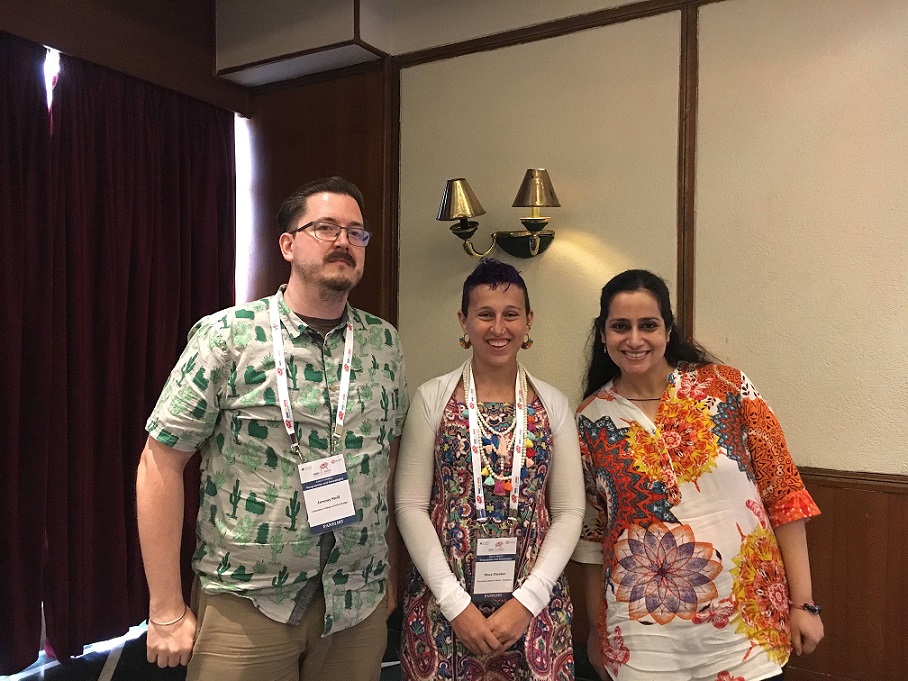
Jeremy Stoll researches comics and leads discussion in India
Jeremy Stoll, Assistant Professor of CORE Liberal Arts and department Head of Science and Social Science, was awarded $5,000 by CCAD’s Griffith Big Project Fund. With the help of the grant, he spent a month and a half over the summer traveling India for fieldwork on comics and community, with a focus on queer creators and new collectives in various city's scenes.
Stoll began his trip conducting interviews with creators in Delhi and presented at the Association for Asian Studies in Asia conference on a panel discussion about the contemporary Indian comics industry. His contribution, titled “Comics Dissonance: Queering the Anthology in India,” spoke to the contemporary creators involved in collections like Drawing the Line: Indian Women Fight Back, Eat the Sky Drink the Ocean, and the Gaysi Zine's queer comics issue.
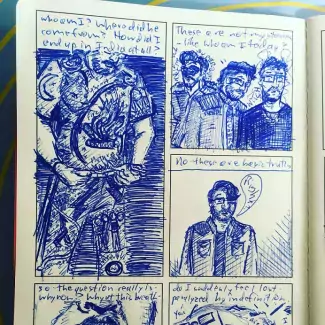
“I argued that their comics work to queer the comics medium in India,” Stoll said, “countering mainstream culture by suggesting alternative ways of understanding gender, sexuality, community, and creativity.”
Additionally, he stayed in Bangalore to visit the Indian Institute of Cartoonists gallery; explore the vast collections of comics archivist Arun Prasad; and present at prominent graphic artist and designer Orijit Sen's Master Practice Studio through the Kochi Biennale Foundation. While attending Sen's studio, Stoll presented a talk on the history of nonfiction comics internationally and in India. He also led a critique of student work alongside Sen, comics editor and creator Vidyun Sabhaney, Swiss artist and comics writer Raphael Perret, and animator Prakash Moorthy.
Stoll’s fieldwork also included interviewing many renowned graphic novel and comics leaders, including Kadak Collective co-founder Aarthi Parthasarathi, and he organized a small Drink & Draw Bangalore event whose attendees included the noted graphic novelist Appupen (aka George Mathen).
“All told, I was able to interview 35 creators and purchased around $300 in graphic novels and comics from the subcontinent, including many examples of mini comics and zine publications that have little distribution even within India,” Stoll said. “I plan to donate a chunk of those works to [the Ohio State University’s] Billy Ireland Cartoon Library at some point in the future, as I continue working on a book manuscript based upon my research on the Indian comics worlds.”
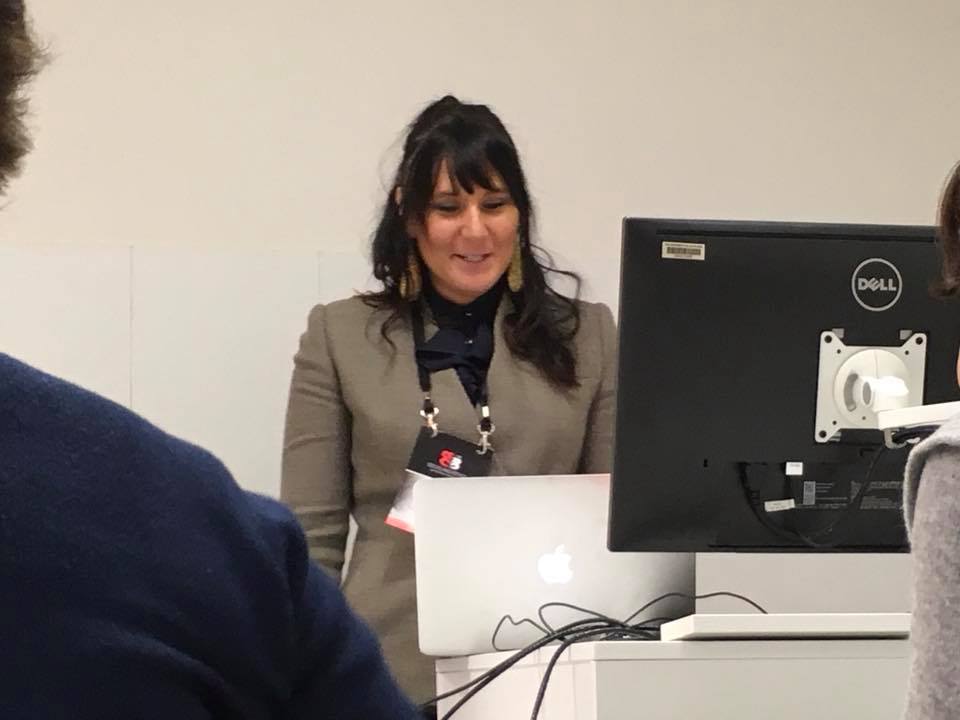
Sonya Fix shares her sociolinguistic work in New Zealand
Sonya Fix, Assistant Professor of CORE Studies and department Head of English as a Second Language, presented at the Sociolinguistics Symposium 22 in Auckland, New Zealand at the end of June. The conference focused on the interconnections and divides across disciplinary, epistemological, and geographical spaces in sociolinguistics.
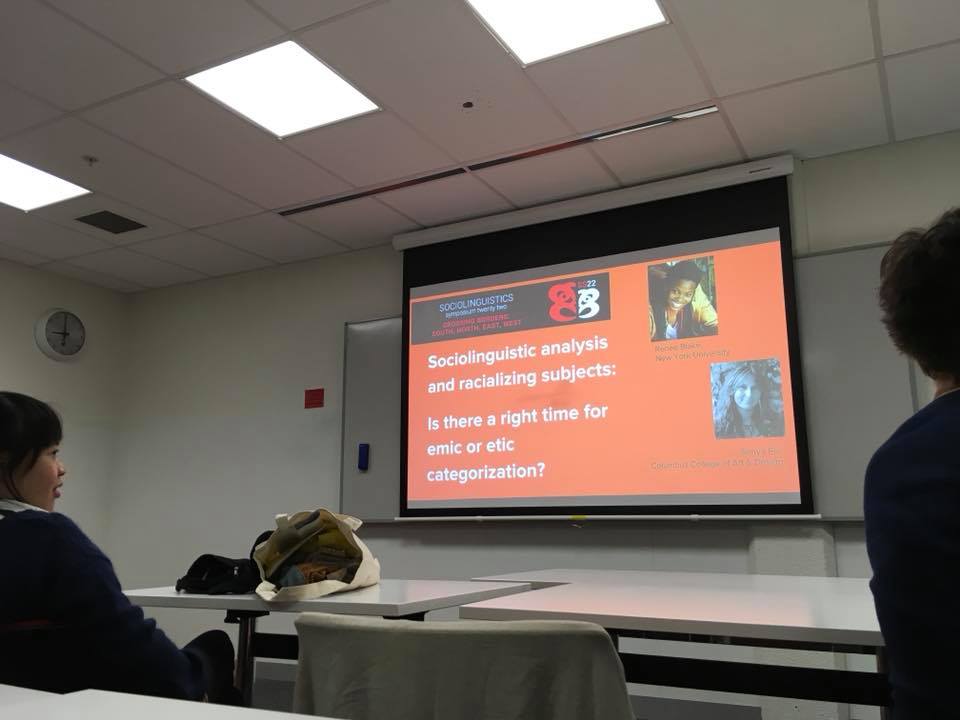
Fix’s presentation was titled “Sociolinguistic analysis and racializing subjects: Is there a right time for emic or etic categorization?” and explored the ways in which racial and ethnic categorizations emerge in sociolinguistic literature and have become reified in both culture and scholarship.
Following SS22, Fix traveled on the country’s north island and visited sites of Maori cultural heritage, such as the Waitangi Treaty grounds. Her experience there will inform her teaching and coursework at CCAD, as will her time at the conference, which featured an opening ceremony in the Maori language of Te Reo, which, Fix said, “illustrates the official role that the pre-colonial language has alongside English at institutional levels as part of the post-colonial language revitalization movement.”
Jeannine Kraft presents on socially engaged art practices in Ireland
Associate Professor and Chair of History of Art & Visual Culture Jeannine Kraft is a PhD researcher with the National University of Ireland, Galway. Her work focuses on the legacy of the representation of the West of Ireland in contemporary Irish visual culture, and this June she presented work titled “Creative Landscapes: Environmental Advocacy in Contemporary Irish Art” at the American Conference for Irish Studies in Cork, Ireland.
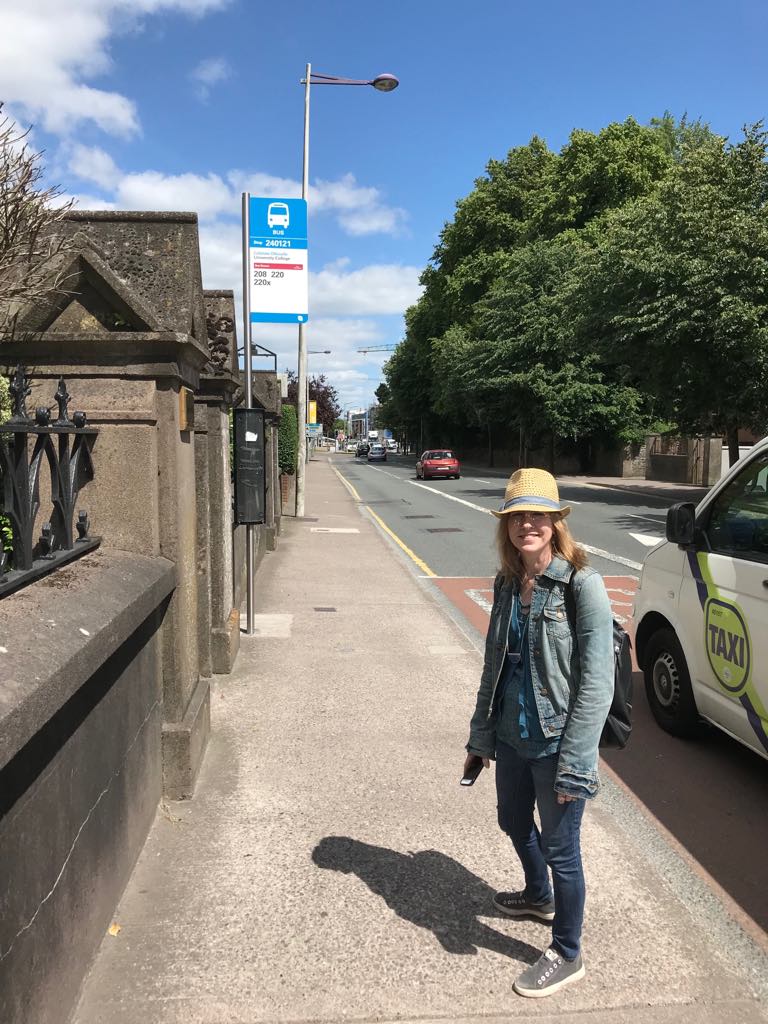
Kraft’s contributions examined how contemporary practitioners of Irish visual arts are creating “work that transcends traditional disciplinary boundaries, with an inherent activist element in its focus on bringing local issues of sustainability and social justice to the fore, radiating that vision to the broader international stage through the networks of culture.” She examined how these artists engage a broader public and can change ideas of place, cultural identity, and relationship to landscape.
“It got a great response,” Kraft said of her presentation. “I was asked to put together a proposal for a chapter of an upcoming book based on the topic.”
In addition to informing her writing and increasing her network, Kraft’s most recent trip abroad is also already impacting the curriculum for her issues in contemporary art class, allowing her to add more insight to discussions about how socially engaged art practices are affecting sustainability, equity, and environmental advocacy.
(Also cool: She got to take a stop in Cork at what she calls “CCAD Ireland,” aka Crawford College of & Art and Design.)
Learn more about CCAD’s Griffith Big Project Fund, faculty, and off-campus learning opportunities for students.
Post date
October 30, 2018